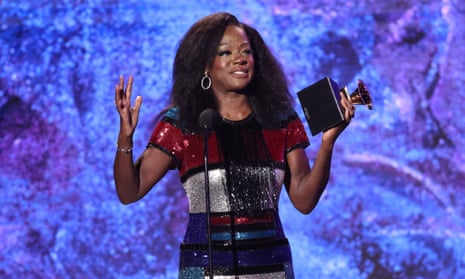Viola Davis has has joined the elite group of Egot winners with her victory at the Grammy awards on Sunday.
Known as US entertainment’s grand slam, the illustrious acronym Egot signifies a recipient of an Emmy, a Grammy, an Oscar and a Tony award. Davis is the 18th person to achieve Egot status, joining the likes of Audrey Hepburn, Mel Brooks, Andrew Lloyd Webber and John Gielgud.
Davis won her first Grammy on Sunday for her audiobook recording of her memoir, Finding Me. She is the third Black female Egot winner, after Whoopi Goldberg and Jennifer Hudson. The musician John Legend became the first Black male Egot winner and joint youngest at the age of 39 in 2018.
“I wrote this book to honor the six-year-old Viola,” Davis said on stage at the ceremony in Los Angeles. “To honor her life, her joy, her trauma, everything. And, it has just been such a journey – I just Egot!”
In the audiobook category, Davis was up against Brooks, a fellow Egot; the composer and actor Lin-Manuel Miranda, who is an Oscar win away from achieving Egot status; and the actor Jamie Foxx and the musician Questlove, who have both won Oscars and Grammys.
The 57-year-old actor is a four-time Academy award nominee, making her the most nominated Black female actor in history. She won the best supporting actress Oscar in 2017 for her performance as the wife of a baseball player in Fences. She also won a best lead actress Tony in 2010 for the same role, in the original play on Broadway.
She is also a five-time Emmy nominee and won in 2015 for her performance in the television show How to Get Away with Murder. Before her Tony win for Fences in 2010, she also won a best featured actress Tony for her role in the Broadway play King Hedley II in 2001.
Her memoir details the racist bullying she endured while growing up in Rhode Island, and her journey from being an admired actor stuck in small roles to being cast as the lead in How to Get Away With Murder, the show that made her name.






